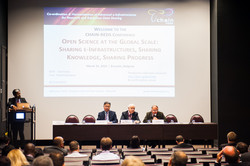Exploring EU-China cooperation on research
A strong cooperation with China on research and innovation is one of the cornerstones of EU-China relations. This is evident particularly through the High Level Dialogue on Innovation Cooperation which aims to promote predictable, transparent and effective framework conditions related to innovation and to develop joint and coordinated actions for the development and deployment of innovative solutions. On the ground, vibrant collaboration projects are ongoing between EU and Chinese researchers, particularly in areas like health, environment and transport. As of February 2014, Chinese entities participated 334 times in FP7 signed grant agreements, receiving a total EU contribution of EUR 32.9 million. A total of 3 845 Chinese researchers have been funded through the Marie Curie Actions (2007-2013) and Chinese institutions have participated in 315 projects. According to Jianru Cao, First Secretary of the Mission of China to the EU, EU-China collaboration will continue to thrive in the coming years. Speaking at the final conference of the FP7-funded CHAIN-REDS project, Mr Cao pointed to China’s recently published reform strategy titled ‘Accelerating Implementation of Innovation-Driven Development’. The strategy will address current institutional arrangements and economic policies that suppress innovation, as well as improving market competition order and enhancing judicial protection for intellectual property right. It will also see the national S&T programme becoming more open to foreign countries. Mr Cao also noted that China is already number three in terms of non-EU countries participating in European research and innovation programmes and predicted that China will become even more actively involved in Horizon 2020 into the future. Although automatic funding from the programme is no longer available for Chinese entities (and other emerging economies and industrialised countries), China remains a key partner in Horizon 2020. Chinese researchers can still seek funding from their national authorities. Indeed, earlier this year, the Chinese Academy of Sciences (CAS) launched the CAS-EU Partner Programme. The aim was to strengthen the strategic S&T cooperation between CAS and the EU in the frame of Horizon 2020 by offering further support to CAS institutes and other CAS entities already part of successfully approved Horizon 2020 projects. EU-China cooperation in research will continue to be further enhanced into the future, Mr Cao noted and the area of space is particularly important: ‘Space cooperation with EU is one of the pillars of China-EU cooperation. In Brussels, we even have a space office in the Chinese Mission to EU.’ ‘China is open to the outside and all national programmes will be open to foreign institutions,’ Mr Cao concluded. For further information, please visit: CHAIN-REDS https://www.chain-project.eu/home EU research and innovation - cooperation with China http://ec.europa.eu/research/iscp/index.cfm?pg=china
Countries
Austria, Belgium, Bulgaria, China, Cyprus, Czechia, Germany, Denmark, Estonia, Greece, Spain, Finland, France, Croatia, Hungary, Ireland, Italy, Lithuania, Luxembourg, Latvia, Malta, Netherlands, Poland, Portugal, Romania, Sweden, Slovenia, Slovakia, United Kingdom



